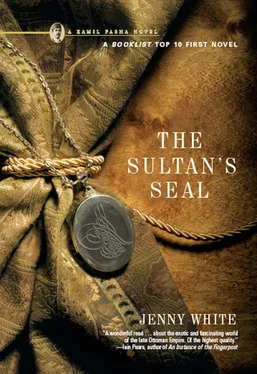Jenny White - The Sultan's seal
Здесь есть возможность читать онлайн «Jenny White - The Sultan's seal» весь текст электронной книги совершенно бесплатно (целиком полную версию без сокращений). В некоторых случаях можно слушать аудио, скачать через торрент в формате fb2 и присутствует краткое содержание. Жанр: Исторический детектив, на английском языке. Описание произведения, (предисловие) а так же отзывы посетителей доступны на портале библиотеки ЛибКат.
- Название:The Sultan's seal
- Автор:
- Жанр:
- Год:неизвестен
- ISBN:нет данных
- Рейтинг книги:5 / 5. Голосов: 1
-
Избранное:Добавить в избранное
- Отзывы:
-
Ваша оценка:
- 100
- 1
- 2
- 3
- 4
- 5
The Sultan's seal: краткое содержание, описание и аннотация
Предлагаем к чтению аннотацию, описание, краткое содержание или предисловие (зависит от того, что написал сам автор книги «The Sultan's seal»). Если вы не нашли необходимую информацию о книге — напишите в комментариях, мы постараемся отыскать её.
The Sultan's seal — читать онлайн бесплатно полную книгу (весь текст) целиком
Ниже представлен текст книги, разбитый по страницам. Система сохранения места последней прочитанной страницы, позволяет с удобством читать онлайн бесплатно книгу «The Sultan's seal», без необходимости каждый раз заново искать на чём Вы остановились. Поставьте закладку, и сможете в любой момент перейти на страницу, на которой закончили чтение.
Интервал:
Закладка:
On cold days, I lay reading on the cushioned divan in the garden pavilion. It was a one-room structure with tall windows looking out over the water. Stacks of mattresses and quilts were kept ready for visitors who preferred to sleep there on hot nights. In winter, wooden shutters protected it against the wind and a brazier provided warmth and heated water for tea, although hardly anyone went there once the weather turned chill.
Mama complained about being isolated from her friends and the social life of the city. It was a long way to come from Istanbul by bullock cart or boat just to share a cup of coffee. The ferry from Istanbul took almost two hours and docked north of here at Emirgan. It took a carriage another hour to come the rest of the distance. Not many ladies had their husbands’ permission to stay the night. Only in summer, when the ladies moved to their summer houses on the Bosphorus, did we socialize. But I loved Ismail Dayi’s house. I was allowed to roam the garden in the benign care of Halil, our old gardener, and, later, under the watchful eyes of Madam Élise, my French governess and teacher.
Those first years in Chamyeri, Papa came once every week to try to convince Mama to return. I heard them arguing behind the carved wooden doors of the receiving room. He told her he would buy a separate house for her, that there was no need for her to live with her brother. But no matter how much I flattened my ear against the door, I never heard my mother’s response. In retrospect, I can see that her refusal to return to Papa’s protection must have shamed him before his family and peers, and this small protest gave my mother strength. By moving into my father’s house, even into a house apart from the one in Nishantashou where he lived with Aunt Hüsnü, Mama would have signaled her acceptance of Aunt Hüsnü as his kuma.
I don’t know whether Papa sent my mother’s financial due to Ismail Dayi, or, if he did, whether Ismail Dayi accepted it. Despite his eccentricities, Ismail Dayi was a respected hodja, a jurist and poet who had inherited his parents’ house and considerable wealth. Mama’s inheritance had gone with her into her marriage dowry, but remained hers to claim. Between Papa’s visits, Mama sat at her needlework in the receiving room, waiting for visitors who rarely arrived, her fingers dancing over the silk thread.
This was our life at Chamyeri until I was thirteen, in the Rumi year 1294, or 1878 by your reckoning, when I found the body of a woman in the pond behind our house. The pond, fed by an invisible spring, is shallow at one end and unfathomably deep at the other. It is so wide that a stone hurled by a young girl will not reach the other side. It is hidden behind a ruined stone wall in the forest. The woman Hannah was floating in knee-deep water, face down, her arms outstretched in an embrace. I did not realize she was dead, having no experience in such things. I stroked her hair. She looked peaceful, like a water princess, and I tried not to disturb her too much as I took her hand and turned her face to the sky. Her blue eyes were open. I told her that I lived here with my mother and my dayi. She looked surprised. I combed her hair with my fingers, arranged her dress, and placed a wildflower against her throat before going back to the house. When I told Madam Élise that a woman was asleep in the water and I could not wake her, I did not yet know the water there was deep enough to drown in.
The Bosphorus is a powerful sinew of water that flexes and pushes and roils down its long, wide chute to the Sea of Marmara, impatient to find the warm Mediterranean and dissolve into the salty womb of the ocean. Young boys from the village jump in and disappear, moments later emerging hundreds of yards downstream, where they must use all the force of their thin brown arms to reach shore again. Despite vigorous rowing, a boat headed upstream seems held in place by an unseen hand. When one next looks out, magically the boat has progressed.
Boats headed south, toward Istanbul, shoot along, passengers holding firmly to the creaking shell as the boatmen battle with their rudders. Halil, who had been a fisherman before he lost two fingers to a runaway net and became our gardener, told me that the Bosphorus has two currents. One runs north to south along the surface, carrying cold fresh water from the Black Sea to the Mediterranean; the other, a slippery rope of warm saline liquid, slithers south to north forty meters beneath the hard-muscled surface. The fishermen know that if you drop a line a certain length, you will catch palamut, lufer, and is tavrit that in spring dangle like silver coins from the fishermen’s lines. If you lower your hook farther, there abide mezgit and kalkan. A net caught up by the lower current will pull a boat inescapably northward. When the lodos blows from the southwest, the currents tangle and shift. The wrong fish are caught. Village boys do not reemerge. Young women drown in knee-deep water.
When Madam Élise saw the dead girl in the pond, she left us that same afternoon, crying and flailing her arms if anyone came near her.
After Madam Élise’s abrupt departure, I was happy. With no lessons, I spent hours perched on the stone wall dangling my legs toward the water below, watching large pleasure kayaks go by like creatures with many legs moving up and down in unison. I could make out the conical red felt hats of the teams of rowers. Veiled ladies sat on cushions and carpets on the foredeck, their heads nodding to one another in conversation like doves. Maidservants shaded them with fringed parasols. If they were women of high officials or the royal family, between the women and the rowers, under a particularly large parasol, would sit a fat eunuch, his dark skin melting into the shade. Sometimes I lay on my back on the warm stones, watching the sky careen about me. The scent of jasmine trailed across me like a cloak worn by the breeze.
When I went to the long, gold-framed mirror in the receiving room, the only mirror Mama allowed in the house, I saw a girl-child with black curls that hung to her waist, eyes a pure azure blue, as if they had absorbed the summer sky. My eyes, mother told me, were inherited from a Circassian ancestor, a slave who had become the wife of a high official.
I learned to swim. I owe that skill to Violet. Violet is the daughter of Mama’s distant relation, a fisherman in Cheshme on the Aegean coast. As a child, I had never been to the coast, but Violet brought it to me-the warm sand, the smell of pine, and above all the kinship with the sea that flows in the veins of all its residents. Violet grew up a dolphin. When she came to us as my companion and servant, I was fourteen and she fifteen.
Violet had been sent to us by her father because he was in need of a new fishing boat. It was not uncommon for a wealthy family to adopt a poorer relative as a servant. The girl was expected to obey and serve her new family and to behave in a manner that brought credit to them. In return, the wealthier family gave her room and board, perhaps a simple education, eventually found her a suitable husband and paid the considerable wedding expenses. Through intermediaries, Ismail Dayi had sent out word that his niece needed a companion and had sent Violet’s father the price of a new boat in return for a chance at a better life for his daughter. As was traditional for servants entering a household, Mama gave her a flower name. Violet, because she was small and shy.
Halil brought her in the cart from the boat landing in Chamyeri. A small brown figure in a rough cloak, she slid from the cart, clutching her bundle. She refused to surrender it to Halil to carry. In the first months, she kept her eyes lowered and spoke only when spoken to. Mama gave her a room at the back of the house that looked toward the road and into the forest. The green of the forest colored the air in Violet’s room, unlike our own bright bedrooms floating between the blues of water and sky. At night, I crept down the corridor and set my ear to her door, listening to the faraway sound of her weeping.
Читать дальшеИнтервал:
Закладка:
Похожие книги на «The Sultan's seal»
Представляем Вашему вниманию похожие книги на «The Sultan's seal» списком для выбора. Мы отобрали схожую по названию и смыслу литературу в надежде предоставить читателям больше вариантов отыскать новые, интересные, ещё непрочитанные произведения.
Обсуждение, отзывы о книге «The Sultan's seal» и просто собственные мнения читателей. Оставьте ваши комментарии, напишите, что Вы думаете о произведении, его смысле или главных героях. Укажите что конкретно понравилось, а что нет, и почему Вы так считаете.












